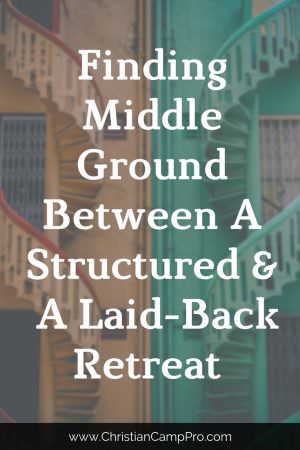
There are two types of people – those who go with the flow, and those who do not. Often in the Church, these two groups clash over and over again when it comes to planning retreats. This is especially bound to happen whenever large groups from different churches come together to collaborate in the planning process.
But the simple truth is that neither personality is necessarily right; God made each of us unique and different for a reason. The problem is that we tend to let those differences divide us. Contrary to popular practice, though, every event does not have to be a vicious struggle over the ‘right way.’ There is a way to find middle ground and save the day for everyone. First, you have to understand where each side is coming from.
The Structured Approach
Some people are natural control freaks, and that’s not always a bad thing. Odds are, they aren’t trying to stress you out or overcomplicate the entire ordeal. They simply want the retreat to be as professional and smooth as possible. They fear that without some sort of structure, the whole event will dissolve into chaos and ultimately fail to achieve its purpose – and they’re right.
The Laid-Back Approach
Other people are simply not concerned about the details of the event. They are content to do whatever is necessary and then sit back and watch it all play out. To them, structure isn’t as important, because no matter what happens, everything will turn out alright in the end. They believe that going the extra mile is often more trouble than it is worth – they are also right.
Accommodating Both
As you can see, both viewpoints have their merits and bring up some important points. The structured people understand the importance of quality planning and refinement in coordinating a retreat. While you don’t have to give into their every demand, it’s often a good idea to at least consider their ideas, because they are only thinking in the best interest of the retreat. On the flip side of that, be sure to see that healthy meticulousness doesn’t spiral into obsessive anxiety, as this can cripple the Church.
As for the laid-back people, they understand the importance of a sound mind and faith in God. They know not to depend too much on their own ability, because nothing ever turns out quite like it’s supposed to. Ensure that you take their suggestions into account, as well, but don’t let their mellow unconcern turn into downright apathy.
If you can create a balance between the virtues of both sides of the spectrum, your retreat will be infinitely better off than it was at the start.

